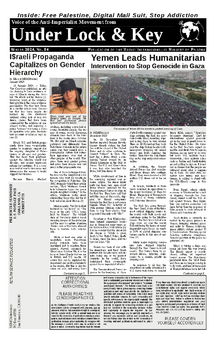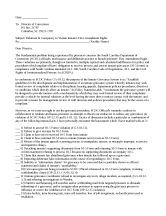Throughout the history of our uncivilized world, those who invade, conquer, colonize, and oppress the people without fail make their first order of business to uproot and destroy the educational facilities and libraries. The oppressor nations and their oppressive apparatus know the importance of books and a proper education.
As we know from history, the Africans who were brought to Amerika and turned into slaves were forbidden to read and write. In fact, to be caught with a book or even attempting to learn how to read and write was a crime for them. These are facts that trouble me immensely, because the more things seem to change, the more they actually remain the same.
In September of 2012 while being housed in the Special Management Unit (SMU) at Lee Correctional Institution, in Bishopville, South Carolina, I filed a grievance, because on 25 April 2012, the then-acting Warden (Michael McCall) had the Rapid Response Team (Red-Team) confiscate all books, newspapers, magazines, etc. from SMU prisoners. I was left without one single piece of paper in the cell; they even took the toilet paper.
And though this was against their own policy (SCDC Policy OP-22.12), it has still been upheld on appeal. It is criminal to hold a human being inside of a cell for twenty-four hours a day with absolutely nothing to read and occupy the mind. While on SMU for almost four years, I developed high blood pressure and mental health issues. Since being off SMU I no longer have signs of high blood pressure and I have resolved my mental health issues on my own. I was taking medication for high blood pressure and the mental health issues and currently I am medication-free.
Some prisoners get their families to order books for them, but some bookstores such as Barnes & Noble have refused to let my family order books that must be sent directly to me, because they've had so many problems with the institutions sending books back. Companies have simply gotten fed up with having to send refund checks, because so many books, magazines, newspapers, etc. (primarily literature pertaining to Black history and culture) are unauthorized and thus, we can't receive them.
Currently I am being held captive at Perry Correctional Institution (PCI), which is in Pelzer, South Carolina. Here at PCI they not only deny prisoners on SMU books, but they've shut down the regular library services as well. The general prisoner population's library services have been shut down for about five months now. We have been told that the books that are currently part of the regular library will be divided up and placed on shelves and/or carts that will be built in the respective dorm units. I have written requests to the staff here concerning the library services (or lack thereof) and they give me the same run-around. I have even pointed out to them that they are not abiding by their own policy (PS-08.04 Library Services) when it comes to how they've shut the library down.
The truly sad part about this whole injustice is that the warden here (Larry Cartledge) is Black (his skin anyway), the Major here (Curtis Early) is Black (his skin anyway), and even the person in charge of the educational building (Linda Bratton) is Black. All of these people should realize the significance and importance of books to a people who have been beaten, lynched, and murdered for attempting to educate themselves in a nation that has done everything possible to stop them from educating themselves. We cannot give Black officials a pass simply because their skin is black. We must hold these "Black people" accountable not only for their actions, but for their inactions as well. This entire system is corrupt and bent on further maintaining and supporting corruption, oppression, and an imperialistic agenda.
The South Carolina Department of Corruption's policy GA-01.12 (Inmate Grievance System May 12, 2014), p. 5 states: "Responses: in most instances, grievances will be processed from initial to final disposition within 171 days." It is no accident that the South Carolina Department of Correction (SCDC) has taken well over two years to process my grievance in question and many many more.
Once the grievance process has been exhausted, the prisoner can file civil suits for various violations committed by the SCDC, but most civil suits have to be filed within a two-year time frame of said violations. The SCDC has developed, maintained, and even nurtured a system of crime and corruption against the very people who they have the audacity to call criminals. They prolong and hinder the grievance process in their attempts to stop prisoners from having their day in court.
When "our people" represent the interest of the oppressive imperialist state, they are not "our people" and we must replace them with those who actually hold our best interest at heart. It is clear that these people are complicit with this corrupt, unjust system of racism, oppression, and imperialism. And though they do not want us to read books, they throw the book at us each and every opportunity they get.
MIM(Prisons) responds: One of the main similarities between present-day U.$. prisons, and the days of U.$. slavery, is the use of people from oppressed groups to act as agents of oppression on behalf of the oppressor Amerikkkan nation. The Uncle Tom phenomena is most clearly exemplified by Barack Obama, the Black President of the United $tates, the world's leading imperialist power. Since the destruction of the 1960s national liberation movements, the New Afrikan nation, and other internal semi-colonies, have been increasingly bought off by the spoils of imperialism. New Afrikan guards in prisons are an ironic example of this integration.
Replacing one guard with another won't change the fact that they are prison guards, and hence determined to fall into the role of oppressor. After all, that's why they get a paycheck! Instead we aim to get rid of the oppressive prison system altogether, by creating a society where this relationship is no longer necessary or legal.
On a country-wide scale, the contradiction between Amerika and the internal semi-colonies is principal. In looking at historical examples, we see that struggles for national liberation have done the most to propel societies out of the oppression of capitalism and imperialism.
Within PCI it sounds like the guards side more with Amerika than they do with their own nation, probably because of all the great "opportunity" that Amerika has provided them. We call this "opportunity" spoils of imperialism: wealth that was stolen from the Third World by the imperialists and divvied up amongst First World citizens on varying levels just enough to prevent revolutionary overthrow of the United $tates government.
And this anecdote from South Carolina paints a picture of why we focus on lumpen New Afrikans, who are easy to locate in Amerika's prisons and have the most subjective interest in overthrowing capitalism, as opposed to trying to organize the New Afrikan petty-bourgeoisie (such as prison guards). The division is a difference of degrees of integration, while on the whole the New Afrikan nation is oppressed by Amerika. In response to the Liberals' demands for less and less discrimination, all we get is increased integration; the underlying national oppression and imperialism is unchanged.
The issue of restricting reading materials to prisoners is a topic with a long history in U.$. prisons and in South Carolina. As much as people like to pretend that policies and legislation have an impact on the ground, they must not get as many letters from prisoners as we do that show just the opposite. As this comrade shows, the laws and policies may be in place, but there is always some way to get around it, usually by citing "security" concerns.
Attempting to hold prison administrators accountable when they do violate their own rules leaves one's grievances to sit unanswered for two years as this comrade's are. And the response from administration is often just a brush off with no practical resolution obtained. Taking them to court over the issue is immensely difficult, even for the most litigious prisoner.
While we can definitely make some significant advances through the court system, we need to always be conscious of the overall picture. The same problems have been going on for decades and even centuries. If bourgeois democracy worked, wouldn't the issues of literacy and free education be resolved by now? Instead we have increased integration (i.e. more parasites leeching from the international proletariat) and individual people battling it out with petty paperwork struggles. Still.
For the lack of response to grievances, a comrade in South Carolina created a petition for the proper handling of grievances. Unfortunately it seems South Carolina does not have a time limit on responding to grievances, which might be a worthwhile issue for a prisoner to take to court if it means there would then at least be a policy in place to limit the time administrators can sit on answering a grievance and thus taking one step closer to satisfying Prison Litigation Reform Act requirements. The campaign to have our grievances addressed is an attempt to show the collective problem of neglect of the grievance procedure, rather than keeping it on the individual scale that is so convenient for prison administrators to disregard. Different states are having different levels of success in their grievance petition campaigns, but overall at least we are further proving how useless the offered forms of relief are in actually resolving problems.
In choosing which campaigns to fight, we assess how they will impact our overall struggle against imperialism. Our role at this point in the struggle in the United $tates is to build public opinion in favor of national liberation struggles of the oppressed, and against the capitalist economic system. Having access to reading materials is hugely important in developing an understanding of revolutionary politics, and by keeping prisoners in the dark with literally no material to read, the state of South Carolina is further delaying our struggle for liberation from all forms of oppression.
Comrades in South Carolina should organize around this lack of access to books and educational materials. If they can manage to get a library back, and to lift restrictions on what books can be mailed in to SCDC facilities, it would have a big impact on prisoner-led study groups and individual study. It would also have a big impact on the breadth and depth of political consciousness in South Carolina prisons, and would be very beneficial for our overall struggle against imperialism. Comrades in South Carolina should write to MIM(Prisons) with their ideas on what United Struggle from Within can do to help fight the censorship in South Carolina prisons!









